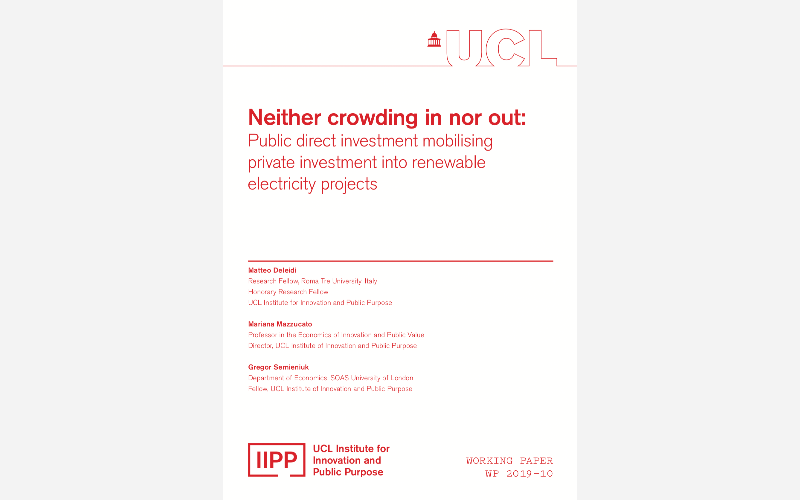Neither crowding in nor out
Public direct investment mobilising private investment into renewable electricity projects.

15 October 2019
UCL Institute for Innovation and Public Purpose (IIPP) Working Paper Series: IIPP WP 2019-10
This working paper was also published as a journal article in Energy Policy.
Authors
- Matteo Deleidi | Research Fellow, Roma Tre University, Italy; Honorary Research Fellow, UCL Institute for Innovation and Public Purpose
- Mariana Mazzucato | Director, Professor in the Economics of Innovation and Public Value, UCL Institute for Innovation and Public Purpose
- Gregor Semieniuk | Department of Economics, SOAS University of London; Fellow, UCL Institute for Innovation and Public Purpose
Reference
Deleidi, M., Mazzucato, M. and Semieniuk, G. (2019). Neither crowding in nor out: Public direct investment mobilising private investment into renewable electricity projects. UCL Institute for Innovation and Public Purpose, Working Paper Series (IIPP WP 2019-10). Available at: https://www.ucl.ac.uk/bartlett/public-purpose/wp2019-10
Abstract
Rapid structural change towards a low-carbon energy supply requires significant additional investments into innovative but high-risk low-carbon technologies. Mobilising greater private investments requires applying the right policy instruments, but while fiscal measures and regulation have been well researched, systematic quantitative evidence about the effect of public direct investment is lacking. Absent empirical evidence, contradictory theoretical arguments claim that such public (co-)investments either ‘crowd out’ or ‘crowd in’ private investors. In this paper we show that the macroeconomic concept of crowding out/in is inapplicable to sectoral studies such as of renewable electricity. Instead, both neoclassical microeconomics and evolutionary economics suggest public direct investment to have a positive effect due to either externalities or market creation effects. We also provide the first quantitative estimate of the effect of public direct investment on private investment into renewable electricity technologies for 17 countries in the period 2004-2014. Using feasible generalised least squares (FGLS) and static and dynamic generalised method of moments (GMM) estimators, we find that public investments not only have a positive but also consistently the largest effect on private investment flows relative to feed-in tariffs, taxes and renewable portfolio standards in general, and for wind and solar technologies separately. Implications for policy aimed at accelerating the low-carbon transition are discussed.
 Close
Close

